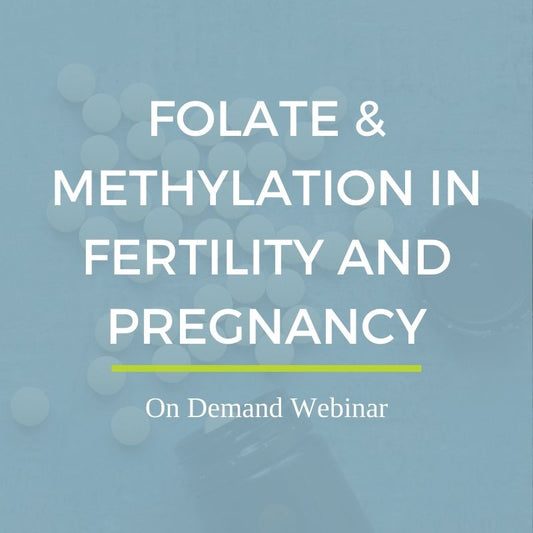B Vitamins for Fertility and Optimal Health
Read more

As a practitioner on a mission to expand comprehensive fertility care and education for all, I am always happy to answer questions from our customers and my private practice clients, no matter how simple or complicated.
The scientist in me loves tackling some of the more complicated questions and fine-tuning answers so that my curious, brilliant-but-perhaps-not-totally-science-oriented-learners have all of the information they need to make big decisions about their health and fertility on their terms.
One of the most weighty questions I get has to do with nutrient considerations for the neural tube during early pregnancy. Specifically, how can food and supplements help support the healthy formation of the neural tube?
The neural tube is an embryonic structure that forms and subsequently closes in the early stages of pregnancy (and I do mean early - we’re talking 4-6 weeks pregnant, which is 1-2 weeks after a missed period). It plays an ultra-critical role in the development of baby, eventually forming their brain, skull, spine, and spinal cord.
With proper nutrients to support the growth of such major bodily structures and organs, healthy development of the neural tube can be well supported
What are the most common neural tube defects?
The two most common NTDs are spina bifida (a spinal cord defect) and anencephaly (a brain defect).
Spina bifida is a birth defect that occurs when the neural tube fails to close during embryonic development, leaving the vertebral column open. Exposed neural tissue degenerates in utero, causing lasting neurological deficits that tend to vary depending on the severity of the lesion.
Unfortunately, spina bifida is a fairly common congenital malformation. 1 per 1,000 births worldwide experience some form of it. While the genetic components of this defect are still largely unknown, we do have evidence that the non-genetic risk factors have a lot to do with insufficient folate intake.
(We’ll come back to that.)
Anencephaly is an extremely serious neural tube defect caused by malformation or complete lack of development of portions of the brain and skull. Spina bifida often accompanies anencephaly, but other malformations like cleft palate, clubbed foot, clubbed hands, and gastroschisis can also occur. The MTHFR gene (which I dive into in deep detail in my B vitamins article) has been associated with anencephaly and other neural tube defects. Sufficient folate intake is absolutely critical to support the healthy formation of the neural tube.
Hint: Folate, or vitamin B-9, is important. Extremely important. It’s one of a handful of nutrients that we will talk about here that can help to support the formation and closing of the neural tube.
All of the nutrients involved in the process of methylation are critical, which is why they are included in our prenatal.
Approximately 30% of neural tube defects are “folic acid resistant”, which means they occur despite the use of folic acid supplementation while trying to conceive. A 2019 study found that women who focused on high intakes of B6, B12, choline, and methionine supported neural tube development significantly. Additionally, glycine functions as a buffer for excess methyl groups, while riboflavin and inositol act as cofactors that keep the entire process running smoothly.
Your diet and supplement regimen should work hand in hand. As a real food RD, LDN, I will always advocate a “food first” approach… for most nutrients.
As far as supplementation goes, when it comes to folate (and honestly, B vitamins in general), my top priority is form, and there are many variables at play that keep us from getting enough folate through diet alone.
Many foods naturally contain highly bioavailable B vitamins and the other nutrients needed to support methylation (think beef, full fat dairy, fish & shellfish, dark leafy greens, legumes, and seeds). However, supplementation should be considered, and when it comes to nutrient considerations regarding supporting healthy neural tube formation. In addition to needs simply increasing along the pregnancy journey, there are many components of our everyday lives that actually deplete our folate, including use of common medications like
Supplementation is usually recommended while pregnant, and especially while trying to conceive considering the fact that mom needs to replete any folate deficiencies prior to conception since the neural tube forms early and closes fairly quickly.
Now, many food and supplements brands will try to fortify their products with folic acid. In fact, folic acid is the most common form of folate found in the foods and supplements we buy specifically to cover this nutrient and help support the development of the neural tube.
That MTHFR gene I brought up earlier creates enzymes responsible for the breakdown of folic acid, which makes the folate our bodies need to build a strong, properly functioning neural tube for baby (3).
Those with an MTHFR mutation (which is incredibly common) have trouble metabolizing folic acid vitamins since this enzyme that processes amino acids functions differently. This means they have a hard time making the methylenetetrahydrofolate reductase needed to convert non-methylated B vitamins into more easily utilized forms. A less efficient MTHFR gene results in an inability to produce enough MTHFR, which causes low levels of folate, which can impact neural tube formation.
And, like I said, this MTHFR mutation is common.
Methylfolate saves the day, splitting the difference and getting the form of B-9 that is easiest for everyone to absorb and metabolize to mom and then to baby.
(Pause for a big sigh.)
There has been some bizarre, inflated controversy from practitioners who - all due respect - might not fully understand or have actually researched this topic in the same way, say, a fertility expert like myself and my colleagues have (4). My entire mission in formulating FullWell’s prenatal was to bring every single nutrient in the optimal form and dose to women who were trying to conceive, pregnant, and breastfeeding in order to ensure they had the healthiest babies possible. This included:
I actually took to social media recently to take questions and explain the science and my confidence behind the inclusion of methylfolate over folic acid in FullWell. It’s definitely worth a listen.
Most of the people claiming that there is no evidence to support the use of methylfolate are anti-MTHFR (yes, it’s a thing), and claim that all of our bodies can be efficient at metabolizing folic acid. But this is the problem with one-size-fits-all medicine, and where my experience treating individuals and studying whole humans case by case comes into play.
Recent studies prove that those who supplemented with folic acid yielded higher levels of unmetabolized folic acid (4). Simply put, it is harder to metabolize folic acid regardless of MTHFR status, which means much of it continues to circulate in its unusable form. Other studies suggest that this circulation of unmetabolized folic acid leads to other adverse effects (5), like decreasing the activity of the natural killer cells that act as a defense system and fight infections during pregnancy (6) and masking B12 deficiencies (7)
The best way to measure your folate status is to run labs with your practitioner. Specifically, you can ask for a RBC (red blood cell) folate test. It’s important to note that this is different from plasma folate, which is a more common lab to run. Plasma/serum folate is transient and reflective of very recent intake, but not a reliable marker of actual status. Because folic acid is readily absorbed in the intestines, it will show up in plasma levels which may make them appear normal. However, absorption does not always equate with utilization, so testing specifically for RBC will reveal any functional deficiencies.
If you'd like to continue to dive even deeper into this topic, I encourage you to check out an important webinar I recently conducted on Folate & Methylation in Fertility and Pregnancy with one of my expert colleagues, Lily Nichols, RDN through The Women's Health Nutrition Academy. With such a high volume of recent medical literature concluding that metabolically active forms of folate are better utilized by the body, we discuss and educate on how this has important implications for fertility, prenatal health, and pregnancy outcomes.
We detail the intricacies of folate metabolism & methylation (and go into great detail on these other complementary nutrients like the ones we've talked about above), and go over nutritional factors beyond folate that support healthy neural tube formation and controversies over MTHFR.
